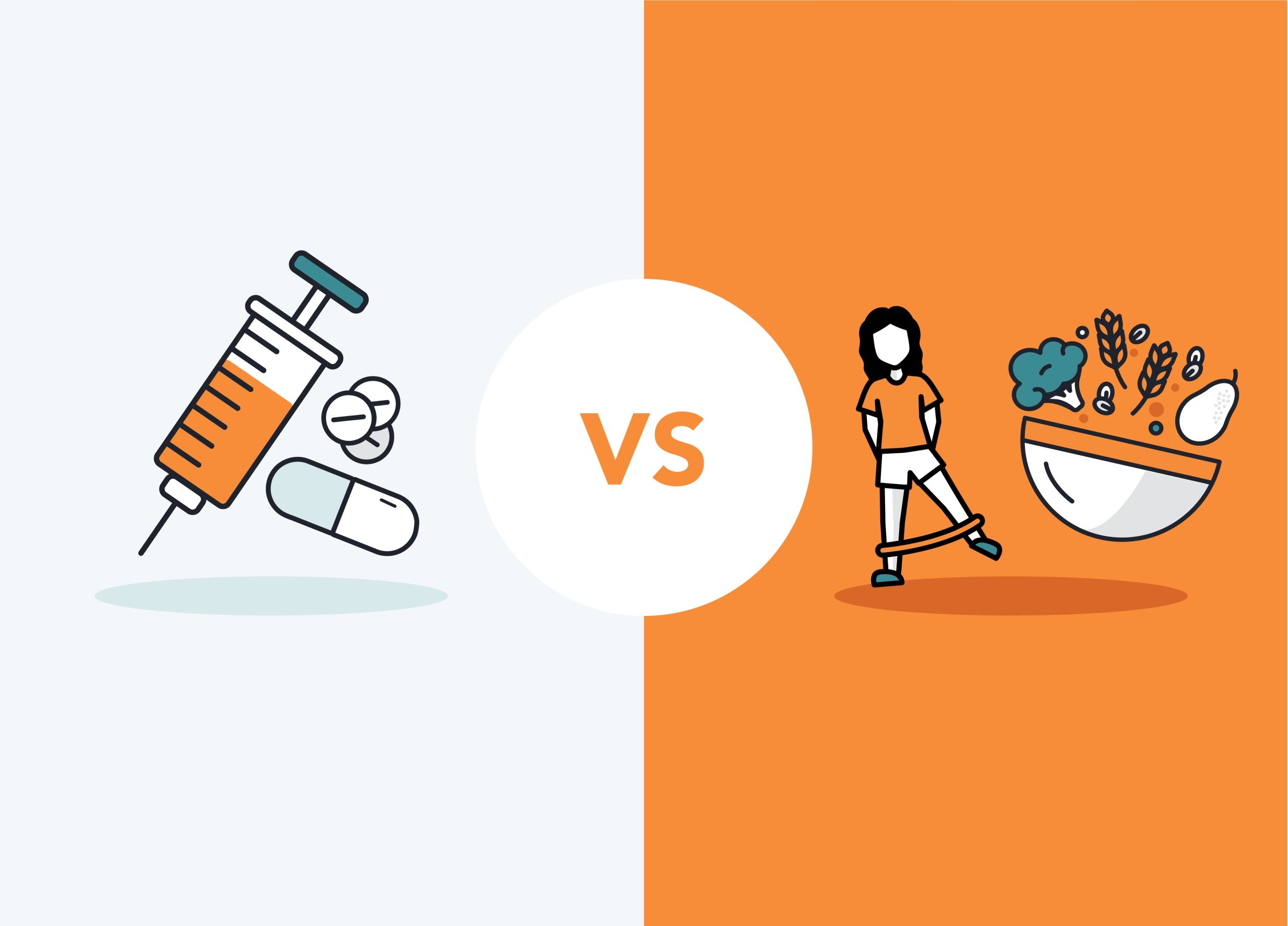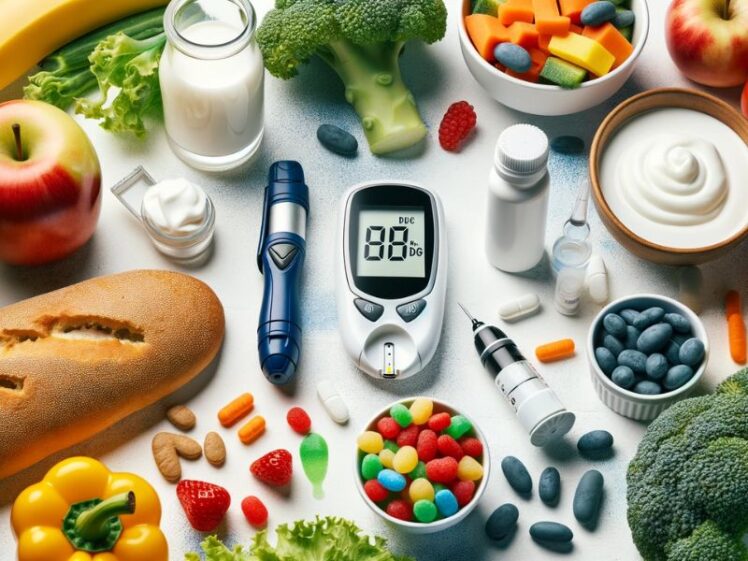Medications vs. Lifestyle Changes – What Works Best for Type 2 Diabetes?

In a world where health often feels like a tightrope walk, managing Type 2 diabetes can stir an array of emotions. Imagine standing on that precipice, weighing options that could pave the way to a vibrant life or lead to complications that shadow one’s future. With over 23 million individuals diagnosed in the United States, the conversation surrounding Type 2 diabetes medications vs. lifestyle changes is not just clinical—it is deeply personal.
Each choice holds the power to transform daily routines and overall health. The American Diabetes Association stresses the urgency of taking immediate action, advocating for a seamless blend of effective medications like metformin and proactive lifestyle adjustments.
By understanding the intricate roles of both strategies, individuals can make enlightened decisions that resonate within their lives, ultimately fostering a path toward improved well-being. Check out our top recommendation: Ozempic.
Type 2 Diabetes and Its Management

Source: lifework.arizona.edu
Type 2 diabetes has become increasingly prevalent worldwide, largely driven by factors such as lifestyle and dietary choices. A pivotal component in understanding this condition is insulin resistance, which sets the stage for developing various health complications. Recognizing early symptoms of Type 2 diabetes can lead to timely intervention and improve overall health outcomes.
The Role of Insulin Resistance in Type 2 Diabetes
Insulin resistance plays a fundamental role in the onset of Type 2 diabetes. When body cells become less responsive to insulin, glucose levels rise, leading to hyperglycemia. Factors contributing to insulin resistance include obesity, a lack of physical activity, and poor dietary choices. Addressing these risk factors through lifestyle changes can reverse insulin resistance, helping to maintain balanced blood sugar levels.
Symptoms and Risk Factors of Type 2 Diabetes
Recognizing the symptoms of Type 2 diabetes is crucial for early diagnosis. Common signs include increased thirst, frequent urination, fatigue, and blurred vision. Individuals at higher risk may have a family history of diabetes, a sedentary lifestyle, or obesity. Understanding these symptoms allows individuals to seek medical advice promptly, potentially slowing disease progression.
Significance of Early Diagnosis and Intervention
Early diagnosis of Type 2 diabetes can lead to effective management and mitigate severe health complications. Screening can help identify insulin resistance before it escalates into full-blown diabetes. Prompt intervention strategies, which may include diet changes, increased physical activity, and regular monitoring, empower individuals to take charge of their health and enhance their quality of life.
Type 2 Diabetes Medications vs. Lifestyle Changes

Source: hstinleypark.com
Managing type 2 diabetes often entails a careful balance between medications and lifestyle changes. Understanding the options available for treatment can provide individuals with the tools needed for effective blood sugar control.
Overview of Common Medications: Metformin, Sulfonylureas, and More
Among the most commonly prescribed medications for type 2 diabetes is Metformin. This medication aids in lowering blood glucose levels by enhancing insulin sensitivity and reducing glucose production in the liver. In addition to Metformin, sulfonylureas promote insulin secretion from the pancreas, which can also contribute to improved blood sugar levels. Other medications such as SGLT2 inhibitors and GLP-1 agonists offer targeted approaches for glycemic control, each with their unique mechanisms of action and potential side effects that must be considered to personalize therapy.
The Impact of Lifestyle Changes: Weight Loss, Diet Management, and Exercise

Source: healthshots.com
Lifestyle changes play a fundamental role in managing type 2 diabetes. Implementing a healthy diet, engaging in regular physical activity, and achieving weight loss can significantly improve insulin sensitivity and overall health. When individuals prioritize lifestyle changes alongside medication, they often experience enhanced blood sugar control and improved well-being over the long term.
Comparative Effectiveness in Blood Sugar Control
Research demonstrates the effectiveness of both medications and lifestyle changes in achieving optimal blood sugar control. While medications may provide immediate results in lowering glucose levels, the long-term benefits of lifestyle modifications, such as sustainable weight loss and improved dietary habits, cannot be overlooked. Each individual’s needs will differ, often requiring a tailored approach that combines both strategies for maximum effectiveness.
Cost-Effectiveness of Different Approaches
Considering cost-effectiveness in treatment choices for type 2 diabetes is crucial for many patients. Metformin remains a cost-effective option among medications. Meanwhile, investing in lifestyle changes, such as healthier food choices and exercise programs, can lead to significant savings by potentially reducing the need for long-term medication. Balancing these options helps optimize financial and health resources for sustainable diabetes management.
Conclusion

Source: news-medical.net
Type 2 diabetes management requires a nuanced approach that balances medication and lifestyle adjustments. Medications such as Metformin and sulfonylureas provide essential support in regulating blood sugar levels. However, achieving optimal health outcomes often hinges on accompanying lifestyle changes. These changes, including weight loss, diet management, and regular physical activity, work holistically to enhance overall well-being and can significantly reduce the dependency on medications.
Research indicates that while medications can deliver immediate results in controlling blood sugar, embracing lifestyle modifications can yield long-lasting benefits, not only improving glucose levels but also enhancing cardiovascular health and quality of life. Adopting a proactive approach by integrating both strategies can empower individuals to take control of their health journeys.
Ultimately, the choice between medications and lifestyle changes is not an either/or scenario. Instead, it’s about creating a comprehensive, personalized management plan that addresses individual needs. By understanding the interplay between medication and lifestyle, patients can chart a course toward better health outcomes and a vibrant life.
FAQ
What is Type 2 Diabetes and how is it managed?
Type 2 diabetes is a chronic condition where the body becomes resistant to insulin, leading to elevated blood sugar levels. Its management often includes a combination of lifestyle changes such as diet management and exercise, and medications like Metformin, which improve insulin sensitivity and control blood sugar levels.
Why are lifestyle changes important in managing Type 2 Diabetes?
Lifestyle changes play a crucial role in managing Type 2 diabetes by addressing underlying factors such as obesity and sedentary behavior, which contribute to insulin resistance. Effective interventions like weight loss, a balanced diet, and regular physical activity can significantly improve blood sugar control and enhance overall health.
What medications are commonly prescribed for Type 2 Diabetes?
Common medications for Type 2 diabetes include Metformin, which helps lower blood glucose levels, sulfonylureas that stimulate insulin secretion, SGLT2 inhibitors that help the kidneys remove glucose, and GLP-1 agonists that enhance insulin response. Each medication has its benefits and potential side effects, making personalized treatment essential.





